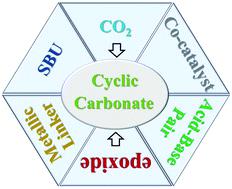当前位置:
X-MOL 学术
›
Dalton Trans.
›
论文详情
Our official English website, www.x-mol.net, welcomes your
feedback! (Note: you will need to create a separate account there.)
Metal-organic frameworks for the energy-related conversion of CO2 into cyclic carbonates.
Dalton Transactions ( IF 3.5 ) Pub Date : 2020-06-25 , DOI: 10.1039/d0dt01516d Feng Guo 1 , Xiuling Zhang
Dalton Transactions ( IF 3.5 ) Pub Date : 2020-06-25 , DOI: 10.1039/d0dt01516d Feng Guo 1 , Xiuling Zhang
Affiliation

|
Excessive emissions of carbon dioxide (CO2) in the atmosphere result in a series of energy and environmental issues all around the word. Thus, it is urgent to prepare efficient materials for the conversion of CO2 as a C1 source into energy-related chemical products. Porous metal–organic frameworks (MOFs) are a class of rapidly growing crystalline materials, which have attracted significant attention for application in the conversion of CO2 into cyclic carbonates. In this review article, the developments made in recent years with respect to the application of MOFs as heterogeneous catalysts for the energy-related conversion of CO2 into cyclic carbonates are highlighted; moreover, we have further discussed the opportunities and challenges in the use of MOFs in this field.
中文翻译:

用于能量相关的CO2转化为环状碳酸盐的金属有机框架。
大气中二氧化碳(CO 2)的过量排放导致全球范围内一系列能源和环境问题。因此,迫切需要制备有效的材料,以将作为C1源的CO 2转化为能源相关的化学产品。多孔金属有机骨架(MOF)是一类快速增长的晶体材料,在将CO 2转化为环状碳酸盐方面的应用引起了极大的关注。在这篇评论文章中,近年来在将MOF用作与CO 2能量相关的转化的非均相催化剂方面的进展突出显示为环状碳酸盐;此外,我们进一步讨论了在此领域使用MOF的机遇和挑战。
更新日期:2020-07-27
中文翻译:

用于能量相关的CO2转化为环状碳酸盐的金属有机框架。
大气中二氧化碳(CO 2)的过量排放导致全球范围内一系列能源和环境问题。因此,迫切需要制备有效的材料,以将作为C1源的CO 2转化为能源相关的化学产品。多孔金属有机骨架(MOF)是一类快速增长的晶体材料,在将CO 2转化为环状碳酸盐方面的应用引起了极大的关注。在这篇评论文章中,近年来在将MOF用作与CO 2能量相关的转化的非均相催化剂方面的进展突出显示为环状碳酸盐;此外,我们进一步讨论了在此领域使用MOF的机遇和挑战。











































 京公网安备 11010802027423号
京公网安备 11010802027423号